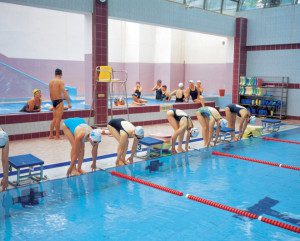Stay healthy during a swim-intensive training block
If you've upped your swimming intensity this winter, here are some pro tips to stay healthy.

While extra swimming is never a bad idea for triathletes thanks to the fact it’s a low-impact sport that can increase your general fitness for triathlon, be careful when approaching a swim-intensive training block. Chlorinated pools can cause respiratory issues, infections and skin irritation. Increasing swimming volume or intensity can also cause repetitive-use injury to shoulders, neck or back muscles. Melanie McQuaid gives tips to help you get the most out of a swim-intensive training block by staying healthy and maintaining consistency.
Infection or Allergy
Swimmers can easily contract sinus or ear infections from the pool. Avoiding illness with adequate recovery from sessions to keep your immune system strong. Pay attention to your recovery meals to ensure you’re getting important nutrients for optimal health.
Chlorine can be irritating to airways. Using sinus rinsing bottles can prevent pathogens from resting in your nasal passages or sinuses.
Brent McMahon trains and races with a nose plug. “I wear a nose plug because I have allergies and sinusitis and therefore a tendency to get sinus infections. So when I wear it in the pool, the chlorine doesn’t irritate and inflame my airways,” he says. “When swimming in open water, the nose plug prevents the pollen that rests on the top of the water from washing through my sinuses. If the allergy season is really bad when swimming in open water I sometimes take Reactine pre-workout just to be sure.”
Swimmer’s ear is a bacterial infection caused by Pseudomonas, a bacteria resistant to chlorine. Most swimmers have suffered from it some point. Dry your ears out after swimming, use ear plugs or wear a swim cap pulled over your ears to help prevent it.
 Avoid wearing outdoor shoes on the pool deck. This helps keep bacteria out of the pool. Chlorine will not kill bacteria entirely, so shower thoroughly for optimal cleanliness.
Avoid wearing outdoor shoes on the pool deck. This helps keep bacteria out of the pool. Chlorine will not kill bacteria entirely, so shower thoroughly for optimal cleanliness.
Avoid bare feet by wearing clean flip-flops on the pool deck and in the shower in order to prevent athlete’s foot and plantar wart infections. Use only your own towel, goggles and snorkel as these items carry bacteria or pathogens that your body can’t fight off even a person you might share with is healthy.
Overuse Injury
Increasing swim mileage can add stress and strain to the swimming muscles, commonly in the shoulder and neck areas. Ryan Cochrane, Canada’s top distance freestyle swimmer and Olympic medalist, is all too familiar with this issue.
“I actually have never gotten swimmers ear, I must have some gaping ears or something, eh?” he jokes, before adding, “Having a good relationship with a physiotherapist and a doctor you trust is something I’d suggest for athletes of all abilities.”
Cochrane says that type of support is integral to his training. “I’m convinced there’s no way I could have continued to swim the mileage I do without (it). We work together closely on any aches and pains which has allowed me to extend my career over a decade. Many athletes underestimate a minor pain in the shoulder or neck, but leaving injuries for even a few days can mean weeks of training that aren’t at 100%. I always have something wrong with me, be it a nerve problem in my feet, bone bruise in my knee, or neck spasm. No matter what it is, I get treatment and support right away. I’ve created those relationships so I never have to worry for more than a day or two whether I’ll be back to full form quickly.”
Managing small aches and pains before they turn into an injury is wise advice. Prevent new problems through proper activation and strength training. Short activation sets (here), shoulder mobility and stretching sessions all help manage your body through hard training. It’s common to see top swim teams on deck early doing strength and activation before all of their swim sessions.
activation and strength training. Short activation sets (here), shoulder mobility and stretching sessions all help manage your body through hard training. It’s common to see top swim teams on deck early doing strength and activation before all of their swim sessions.
Incorporating these ideas into your pre-swim routine should help you avoid illness or injury during large swim blocks. Happy training!
